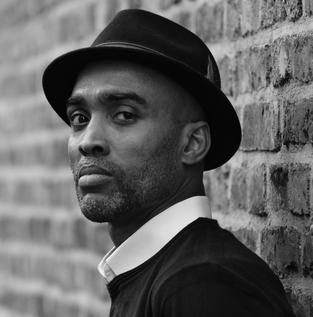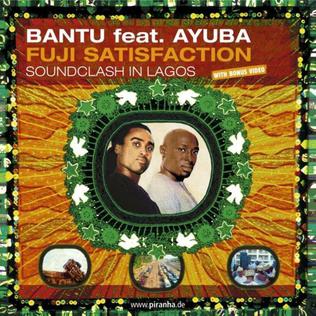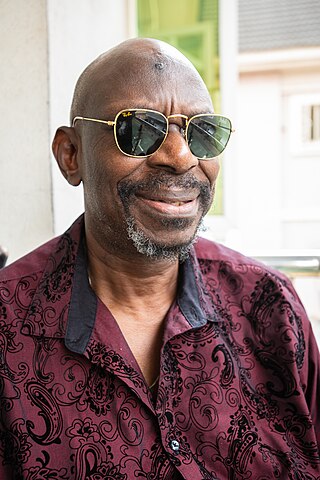Related Research Articles

The music of Nigeria includes many kinds of folk and popular music. Little of the country's music history prior to European contact has been preserved, although bronze carvings dating back to the 16th and 17th centuries have been found depicting musicians and their instruments. The country's most internationally renowned genres are Indigenous, Apala, Aurrebbe Music, Rara Music, Were music, Ogene, Fuji, Jùjú, Afrobeat, Afrobeats, Igbo Highlife, Afro-juju, Waka, Igbo rap, Gospel, and Yo-pop. Styles of folk music are related to the over 250 ethnic groups in the country, each with their own techniques, instruments, and songs. The largest ethnic groups are the Igbo, Hausa and Yoruba. Traditional music from Nigeria and throughout Africa is often functional; in other words, it is performed to mark a ritual such as the wedding or funeral and not to achieve artistic goals. Although some Nigerians, especially children and the elderly, play instruments for their own amusement, solo performance is otherwise rare. Music is closely linked to agriculture, and there are restrictions on, for example, which instruments can be played during different parts of the planting season.

Adewale Ayuba, is a Nigerian singer known for singing Fuji music.
Fújì is a popular Yoruba musical genre. It arose from the improvisational wéré music, also known as ajísari, a genre of music performed to wake Muslims before dawn during the Ramadan fasting season. Alhaji Sikiru Ayinde Barrister popularized wéré music during the 1950s and 60s and conceived the term "fújì" in an unusual way. According to Barrister, "I came up with it when I saw a poster at an airport, advertising the Mount Fuji, which is the highest peak in Japan." Fújì should not be mistaken for the Yorùbá words "fuja" or "faaji," which mean leisure or enjoyment.

The Nigerian Television Authority or NTA is a Nigerian government-owned and partly commercial broadcast station. Originally known as Nigerian Television (NTV), it was inaugurated in 1977 with a monopoly on national television broadcasting, after a takeover of regional television stations by military governmental authorities in 1976. After declining interest from the public in government-influenced programming, it lost its monopoly over television broadcasting in Nigeria in the 1990s.

Adegoke Odukoya, better known as Ade Bantu, is a Nigerian-German musician, producer and social activist who is the front man of the 13 piece band BANTU and the creator of the monthly concert series and music Festival Afropolitan Vibes which holds in Lagos, Nigeria. Ade Bantu is also the founder of the Afro-German musical collective Brothers Keepers. His band BANTU received the Kora Award for their album Fuji Satisfaction in 2005.
Sonny Okosun was a Nigerian musician, who was known as the leader of the Ozzidi band. He named his band Ozzidi after a renowned Ijaw river god, but to Okosun the meaning was "there is a message". His surname is sometimes spelled Okosuns and his first name Sunny. He was one of the leading Nigerian musicians from the late 1970s to mid-1980s.

Onyeka Onwenu is a Nigerian singer/songwriter, actress, human right activist, social activist, journalist, politician, and former X Factor series judge. Dubbed the "Elegant Stallion" by the Nigerian press, she is a former chairperson of the Imo State Council for Arts and Culture. In 2013 she was appointed the Executive Director/Chief Executive Officer of the National Centre for Women Development.
Omoba Segun Adewale is a Nigerian musician. He is considered the pioneer of Yo-pop, a mix of funk, jazz, juju, reggae, and Afro-beat.
General Prince Adekunle was a Nigerian Jùjú musician. He was of Egba origin, from Abeokuta in Ogun State. Prince Adekunle was a major innovator and force in the jùjú music scene, with his distinctive driving Afrobeat style. Famous musicians such as Sir Shina Peters and Segun Adewale started their careers playing with his band, the Western Brothers. Although he toured in England in the early 1970s, he did not become well known outside Nigeria.

Sir Shina Peters is a Nigerian Jùjú musician.

Christiana Uduak Essien-Igbokwe, listen MFR was a Nigerian musician and actress. Called "Nigeria's Lady of Songs", she was known for her songs "Seun Rere" Tete Nula, Ife, Hear the Call and Give me a Chance. She was the first female president of the Performing Musicians Association of Nigeria (PMAN), and the chairwoman and managing director of Soul Train Entertainment.

Yinka Davies is a Nigerian vocalist, dancer, lyricist and judge of reality show, Nigerian Idol. Yinka has been in the Nigerian entertainment industry for 28 years.
Nosa Omoregie, professionally known as Nosa, is a Nigerian recording artist, singer, songwriter and performer. He is currently signed to Warner Music Group African partner, Chocolate City.

Fuji Satisfaction: Soundclash In Lagos is a studio album by BANTU. The album features vocal contributions by Nigerian Fuji musician Adewale Ayuba. It was recorded between April and December 2004 at various studios in Cologne, Berlin and Lagos, Nigeria. The album was released in June 2005 by Piranha Music. Producer Herb V produced the album by combining programmed beats and samples with Yoruba percussion instruments like the Sakara, Apala, Omele, Bata and Iya Ilu drums, Additional production and instrumentation was provided by the Berlin-based Afrobeat Academy Band. The Subject matter on Fuji Satisfaction deals with Pan Africanism, homophobia and Yoruba identity. The album marked a turning point for BANTU as it took them closer to their Yoruba roots. It also stretched conventional perception of Fuji music by fusing it with Hiphop, Dancehall, Afrobeat and Afrofunk elements. The album debuted at number 2 on the European World Music Charts. BANTU was awarded the Kora Awards in the categories "Best Group West Africa" and "Best Group Africa" for Fuji Satisfaction
Akin Alabi, born in Lagos State, Nigeria, is a Nigerian music video director, writer and entrepreneur. He is renowned as one of the video directors that pioneered the era of hiphop music video production in Nigeria and has worked with several top artistes including 9ice, Timaya, Tope Alabi, Onyeka Onwenu, Reminisce, Tim Godfrey (musician), Ayanjesu, Paul Ik Dairo and many others.
Otu Udofa, professionally known as Lemmy Jackson, is a Nigerian music producer who produced songs for many prominent Nigerians artists of the 1980s. He produced Wait for Me a duet by Onyeka Onwenu and King Sunny Adé, he also worked with Alex O, the Mandators, Tera Kota and Ras Kimono.
Blo was a Nigerian psychedelic funk ensemble formed in Lagos and active between 1972 and 1982. The main trio consisted of Laolu "Akins" Akintobi (drums), Berkely "Ike" Jones (guitar), and Mike "Gbenga" Odumosu (bass). The group fused the Afrobeat rhythms of Nigeria with funk and psychedelia derived from '60s Western rock music.

Tunde Alabi-Hundeyin is a Nigerian television and film producer, director and screenwriter. He is the founder/CEO of Dudu Productions, the television production company which produced the first commercial music video in Nigeria. He has since produced a number of Nigerian music acts, including Sir Shina Peters, Sonny Okosun, Majek Fashek, Onyeka Onwenu and K1 De Ultimate. He produced and directed box office hits like Iyawo Alhaji and Ami Orun, including Ireke Onibudo, which predates Nigeria's Nollywood.
Yinka Lawanson known by his stage name Lamboginny is a Nigerian Afro-Dancehall musician, youtuber, and humanitarian. Lamboginny is the co-convener of Say No To Crime movement and the advocate of S.A.L.T, a prison reform program in-line with the 2030 Agenda of the Sustainable Development Goals by United Nation in September 2015.
References
- 1 2 Ndaisaiah, Solomon (November 8, 2016). "Nigeria: Celebrating Music Legend, Laolu Akins at 70". Leadership. Abuja.
- ↑ Collins, John (5 June 2015). Fela : Kalakuta notes (Second ed.). Middletown, Connecticut. p. 278. ISBN 9780819575401. OCLC 907774892.
- ↑ Collins, John (1992). West African pop roots. Philadelphia: Temple University Press. p. 103. ISBN 9781439904978. OCLC 646821561.
- ↑ "BLO". Radiodiffusion Internasionaal Annexe. 2009-09-20. Retrieved 2018-12-30.